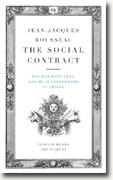The Social Contract (Penguin Great Ideas)
Jean-Jacques Rosseau
book reviews:
· general fiction
· chick lit/romance
· sci-fi/fantasy
· graphic novels
· nonfiction
· audio books
· author interviews
· children's books @
curledupkids.com
· DVD reviews @
curledupdvd.com
newsletter
win books
buy online
links
home
for authors
& publishers
for reviewers

 |
The Social Contract (Penguin Great Ideas) Jean-Jacques Rosseau Penguin Paperback 176 pages May 2006 |
|
The era from the rule of Louis XIV of France (1651) until the French Revolution (1789) is known as France’s period of absolutism. The country’s populace was divided into three factions ─ the clergy, the nobility, and the remainder of the population. There was a conscious attempt by the monarchs to broaden their rule and administrative power over their subjects and over the socioeconomic order by which those subjects were categorized.
Rousseau’s The Social Contract: Man was Born Free and He is Everywhere in Chains (1762) is his most important discourse on politics. He argues that humans were “born free.” Developing on Thomas Hobbes’ theory of the social contract, Rousseau writes that every human has a natural right to preserve his or her life. Like Hobbes, Rousseau recognizes a need for a moral authority. Authority is only legitimate if that authority is used to help the subordinate person survive. A social contract that protects those that are to be governed must be formed. In the state of nature of nature all men are free. No human is capable of selling his or her freedom. All had remained equal until the institution of private property led owners to protect what was theirs. To repair this situation, Rousseau proposes a government by the “general will.” Supreme authority should be held by all people, acting as a sovereign. Their rule would be absolute and indivisible. The people would act together as legislators, executors, and judges. Thus the “general will” is directed to that which is good for all. With the “general will” thus creating a “moral and collective person,” individuals would relinquish their rights to the sovereignty, but individuals are still free to express their own will. Rousseau's The Social Contract progresses the case for democratic constitutionalism derived from popular sovereignty. He defines "freedom" as participation and the duty to observe laws one has a hand in making. Rousseau exhibits a strong disdain for monarchial government. He states, “An essential and inevitable defect, which will always make monarchial government inferior to republican government, is that whereas in republics the popular choice always elevates to the highest places enlightened and capable men… those who rise under monarchies are nearly always muddled little minds…” The Social Contract is a brilliant eighteenth-century masterpiece. Rousseau’s ideas of “liberty, equality and fraternity” would be refined thirty years later in the French Revolution. Originally published on Curled Up With A Good Book at www.curledup.com. © Bridget D. Harrell, 2006 |
|
|
|
 Click here to learn more about this month's sponsor! |
|
| fiction · sf/f · comic books · nonfiction · audio newsletter · free book contest · buy books online review index · links · · authors & publishers reviewers |
|
| site by ELBO Computing Resources, Inc. | |
 The Enlightenment and the growth of public opinion encouraged individuals to take a look at the human condition and the inequalities of class division. One such philosopher to emerge in eighteenth-century France was Jean-Jacques Rousseau.
The Enlightenment and the growth of public opinion encouraged individuals to take a look at the human condition and the inequalities of class division. One such philosopher to emerge in eighteenth-century France was Jean-Jacques Rousseau.